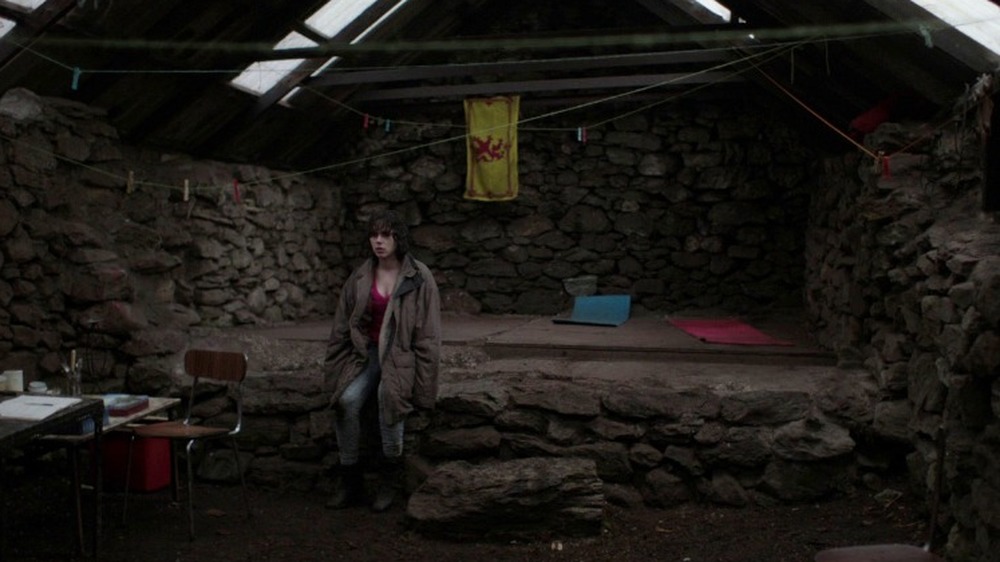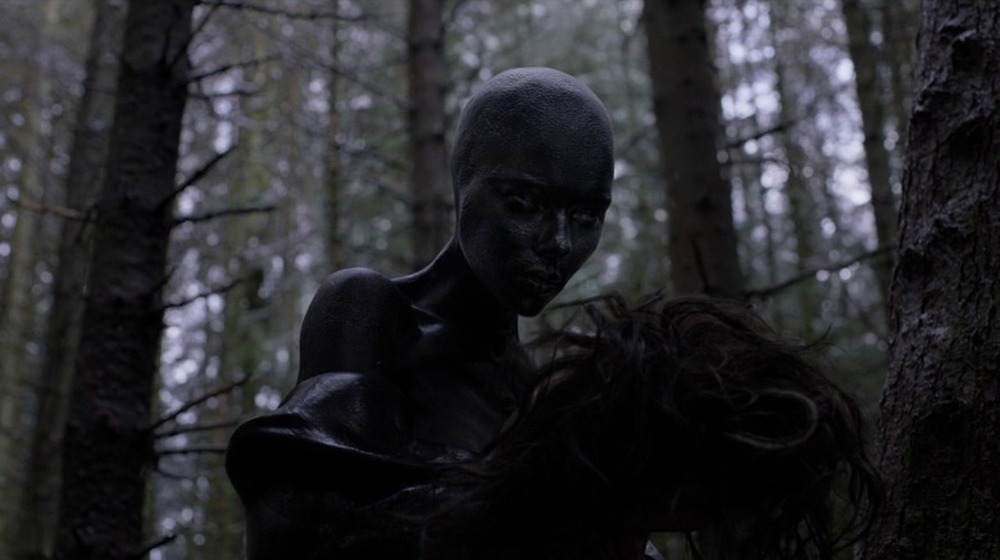The Ending Of Under The Skin Explained
Every so often, a movie comes along that defies typical categorization. Under the Skin, one of the best films of Scarlett Johansson's career, isn't your run-of-the-mill science-fiction film, nor is it entirely horror. Instead, it's a thoughtful meditation about what it means to have an identity.
On the surface, the film, which is set against the atmospheric backdrop of Glasgow, sounds fairly straightforward: The Black Widow actress portrays an alien who takes on human skin. She is tasked with luring unsuspecting men to their deaths by submerging them in a black goo. As the film goes on, though, she learns to connect with humans, and slowly gets to know Earth, taking in small gestures and sensations, from the texture of a chocolate cake to the hustle and bustle of a shopping mall. If you're thinking that doesn't sound too scary, then be prepared for a wild ride that's simultaneously one of the most intriguing and disturbing films of the last decade.
Everything in Under the Skin is anchored by Johansson's performance. For most of the movie, she seems eerily empty, reflecting the alien's total lack of anything that might resemble humanity. But in the lead-up to the ending, director Jonathan Glazer captures a strange awakening in Johansson's demeanor. Forced to confront the nature of human life and identity, "the Female" becomes just as alienated from her own kind as she is from us. This disconnect sends her on a new path, towards a denouement so bizarre it's still hotly discussed to this day.
Under the Skin — and its ending — is all about Scarlett Johansson's performance
There are many possible thematic interpretations of Under the Skin. Depending on who you ask, it can be a story about the essence of humanity, about womanhood and rape culture, or about being an immigrant. And the Female's demise has a different meaning in each of those readings. Regardless, the core element in Under the Skin remains the same: its central character. And while most stories follow a certain character as they go from being something to being something else, this film shows a character becoming something in the first place.
At first, the Female has no characteristics. She robotically performs her tasks — talking, luring, killing — for maximum efficiency. But physically interacting with the world as a human makes her, materially speaking, human. She trips over on the street, experiencing shock, and gets helped by passersby, experiencing community and solidarity. She sees herself in the mirror, and realizes she's also being observed when she observes others. She has a conversation with a man whose experience of intimacy and sexuality is unusual, and in talking to him she has to process what he's saying, generating empathy.
All of this, extremely gradually, leads her to stop seeing herself as a mere conduit for her mission, and to start developing a sense of subjectivity. Since she was never human before, she "becomes human" as a blank slate, capable of human feeling but without memories or a personality. So she goes looking to fulfill primal human needs: food (which the alien part of her body rejects), sex (which she can't do because of her incomplete anatomy), and finally, shelter from the snow, and rest after running around all day. And it's at this point that she meets her doom.
In the end, we finally see what's 'under the skin'
After trying to escape from society, the Female finds shelter in a building in the woods. She wakes up to find a logger raping her, so she flees. The man eventually catches up to her and attacks her, ripping off a part of her human skin and seeing the featureless creature underneath. As she begins peeling off her skin, the logger dumps gasoline on her and lights her on fire. The object of his lust has now become a source of fear and animosity. He kills the alien simply because he doesn't understand what it is.
The tragic ending of the Female's story doesn't necessarily "mean something" for her, character-wise. She just has the misfortune of stumbling into danger without the human wherewithal to escape it, or the human coping mechanisms to endure it. Just as she's beginning to feel emotions, she is so overwhelmed by them, specifically the pain and impotence of the rape attempt, that she desperately and irrationally sheds her human skin, sealing her fate prematurely.
Now, if you view Under the Skin as a commentary on the human condition, the ending reveals that being human is a combination of internal and external factors, a psychological build-up informed by years and years of physical sensations, and that it would be impossible to live in our world without one or the other. If you view it as a feminist film, the ending clearly illustrates the extent to which a woman's subjectivity can be breached and kept from blooming to its full potential by patriarchal violence. And if you view it as an immigrant metaphor, the ending captures the feeling of being lost in the shuffle of a hostile culture, trying to master its rituals, only to risk it all the moment you make one false move or hit some rough weather.
Under the Skin leaves many questions unanswered
It's natural if you have some questions by the end of Under the Skin, and honestly, we're right in that boat with you. Unlike more mainstream films, this story doesn't have a ton of exposition tacked on, and you mostly have to gather information via context clues. As such, it's common to be perplexed by some of the more obscure aspects of the movie.
What do the aliens want with the organs of men? Was the dead woman we saw at the beginning of the film one of the aliens? What exactly is the motorcyclist's role in all of this? Are the black pools real, or are they on a different plane of existence?
We hate to disappoint you, but there's a reason it's one of those movies people don't understand: Pretty much everything in this film is open to interpretation. No concrete solutions are present, and ultimately, we're not even sure if the answers matter all that much. Would knowing about some grand evil plan the aliens have for abducting humans enhance your viewing experience? Probably not — because the movie isn't about fighting off aliens. This is a film about an otherworldly creature not knowing her true identity, and when she tries to become human, she meets an untimely demise. It's best viewed through that lens instead of focusing on some of the more minor details.
How the ending of Under the Skin differs from the book
Under the Skin is based on a novel of the same name by Michel Faber that came out in 2000. As expected with any adaptation, there are differences between the two, such as how the protagonist's name in the book is Isserley — while no one calls her by anything in the film — and the fact that the book presents a clear allegory for factory farming. However, one of the most interesting ways in which these two mediums diverge is in their endings.
Believe it or not, the book actually ends more ambiguously than the movie. In the novel, we see Isserley begin to question whether she wants to continue obeying her alien bosses while she's transporting one of her prospective victims to a remote location. While she's having this crisis of the soul, she ends up in a car accident, never making a finalized decision about what path she wants to take. Should she become fully human or obey her programming? The movie, of course, sees her make a definitive choice, allowing the disfigured man to walk free and attempting real human connection. Her tragic fate occurs as a result of that decision.
Under the Skin remains a movie that demands attention and analysis — and the themes you get out of it may reveal even more about you than the film itself.




